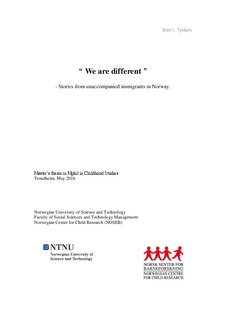"We are different" : stories from unnacompanied immigrants in Norway
Master thesis
Permanent lenke
http://hdl.handle.net/11250/2401968Utgivelsesdato
2016Metadata
Vis full innførselSamlinger
Sammendrag
Being alone, without parents or responsible legal guardians is what recognizes unaccompanied immigrants, a group of young people and children meeting a new culture on their own. This thesis gives insight in the experiences from seven young men aged 18 – 23 and their arrival in Norway as unaccompanied immigrants. Central themes are the past, what they left behind, and what they met in Norway and the reality today, transnationalism. Their narratives will be discussed in the light of Bourdieu´s theory of practice.
Unaccompanied immigrants are a group that seems to be met by ambiguity from the Norwegian welfare state, and society. Especially for those who happen to have turned 15 years old before arrival, as they are not the responsibility for the child welfare system. This thesis aims to investigating the social, and cultural changes and how unaccompanied immigrants use their agency to be integrated. The institutionalized welfare state leaves the responsibility for integration to the individual supported from the care system in the municipalities.
Unaccompanied immigrants are a complex and heterogeneous group of youth, met by the Norwegian welfare system with the focus of making them independent citizens within a short period of time. Their social capital and habitus have been constructed in a collectivistic culture. Now, being present in Norway raises the question if the social capital is relevant for the new culture and society. Access to social fields is of importance for integration, and increasing ones social capital, in order to benefit from it. This thesis aims to give insight in this cultural transition from country of origin and the new social and cultural reality in “the child friendly welfare state called Norway”.
